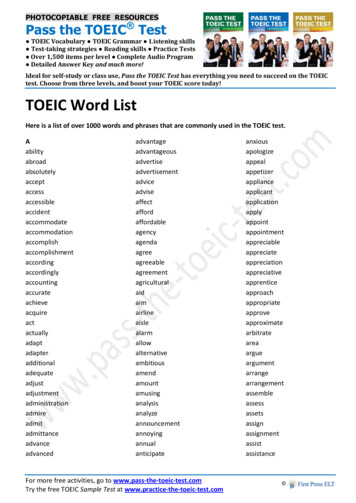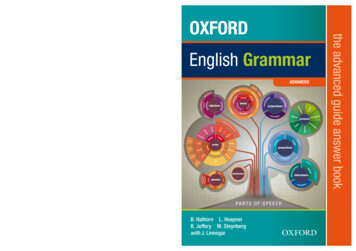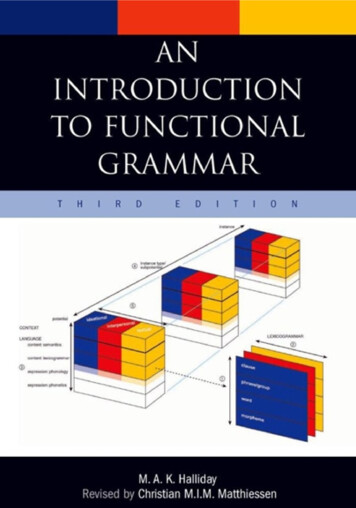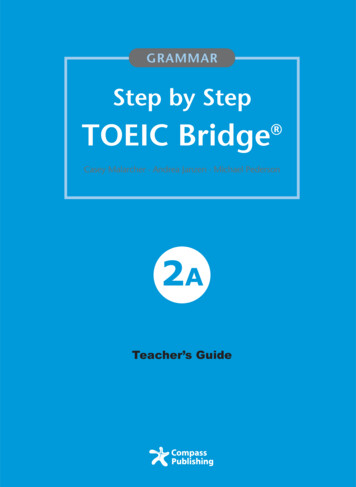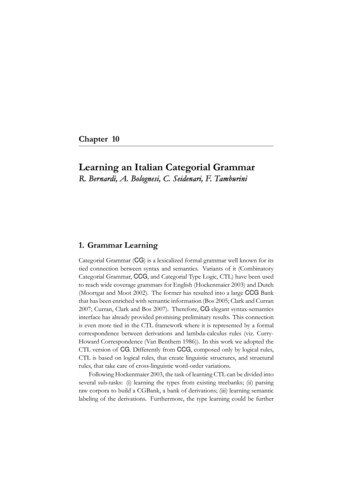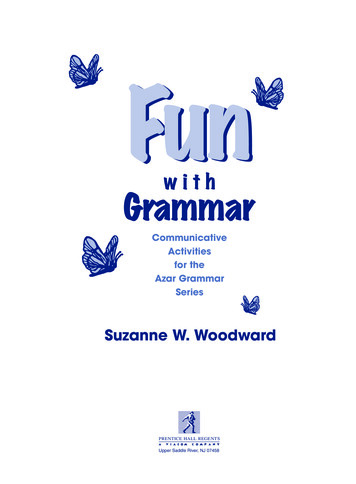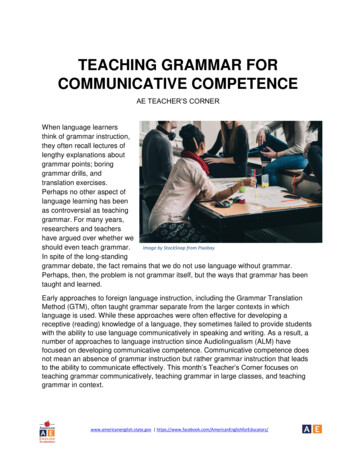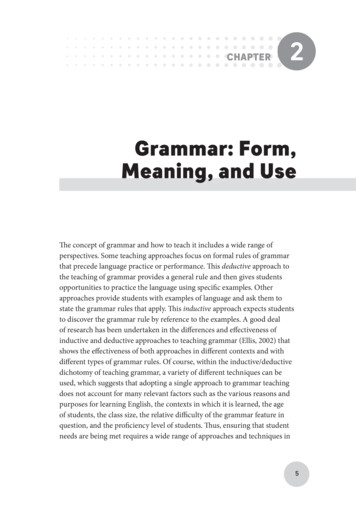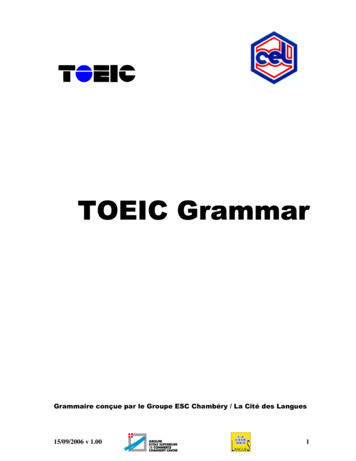
Transcription
TOEIC GrammarGrammaire conçue par le Groupe ESC Chambéry / La Cité des Langues15/09/2006 v 1.001
NounsTipCheck whether the noun is countable or uncountable!Countable oruncountablenouns:definitionsCountable nouns (people, animals, objects, plants, units of measurement)can be counted, used with the indefinite article and be plural. two men; a dog; carsUncountable nouns (substances, materials, abstract ideas, languages) cannotbe counted, used with the indefinite article and are singular. water; moneyUncountablenounsThe following nouns are always uncountable :advicebaggage, edgeleisuremoneynewsprogresstrafficweatherwork The information you gave me is incomplete. She is making good progress with her German.A piece ofUncountable nouns can be made countable by combining them with: expressions like a piece of , a can of , a slice of a piece of information, a can of soda, a slice of bread other nounsleisure activities, homework assignmentsBoth countableanduncountableMany nouns can be used as countable and uncountable nouns, usually witha difference in meaning :Uncountablepaper (material)business (all business transactions)space (the universe)work (employment)time (hours, days )Countablea (news)papera business (a company)a space (a blank)a work (of art)a time (an occasion) They have some work to do on the acoustics. If the global economy continues to flourish, people will continue buyingworks of art.Ce sujet continue page suivante15/09/2006 v 1.002
Nouns, SuiteTipCheck whether it is the right plural!Singular andpluralNote the singular and plural forms of the following nouns.SingularPluralirregular-f(e) : half, life, self.childfoot, toothmousealumnus, syllabus analysis, crisis criterion, phenomenonman, womanalways singularnewsthe United States of America,nouns in -ics : athletics,mathematics, economics -ves : halves, lives, selves.childrenfeet, teethmicealumni, syllabi analyses, crises criteria, phenomenamen, womenalways pluralbelongings, clothes, contents,earnings, goods, people, customs,mediaone thing, two parts : pants, shorts,jeans, glasses, binoculars, scissors.same as singularmeans, series, species, crossroads, headquarters, fish, sheep, data, aircraftExample : The news is disturbing. Tracking bank transactions as a means of pursuing potential terrorists hasbeen central to US intelligence.Hundred,thousand When dozen, hundred, thousand, million, billion are used to convey theidea of: a definite number, the pattern is:number/several hundred, thousand, million plural nountwenty thousand dollarsEconomists were alarmed by the deficit, which was several billionworse than they had expected. an indefinite number, the pattern is : hundreds, thousands, millions of plural nounI've told you hundreds of times.Ce sujet continue page suivante15/09/2006 v 1.003
Nouns, SuiteForms ofaddressMr Smitha manMrs Smitha married womanMiss Smithan unmarried womanMs Smitha married or unmarried womanThese forms of address have to be followed by a family name.AbbreviationsAbbreviationExpression/word in fullAbbreviationExpression/word in fullas soon as possibleValue Added TaxASAPVATRépondez SVPBrothers /s/RSVPBrosto the attention tionp.p.Corpid est (that is)Incorporatedi.e.Incper annumLimitedp.a.Ltdexempli gratia (for example)Public Limited Companye.g.PLCPlease Turn OverAutomatic Teller MachinePTOATMante meridiemChief Executive OfficerAMCEOpost meridiemInformation TechnologyPMITnumberMaster of Business Administration# or NoMBApost office boxResearch and DevelopmentPOBR&DatPublic Relations@PRmiscellaneousHuman ResourcesmiscHRpound(s)Personal Computerlb or lbsPCounce(s)ozGreenwich Mean TimeGMTthe sameidmiles per hourmphnota bene (take note)NB15/09/2006 v 1.004
DeterminersDefinitionA determiner is a word that is normally used at the beginning of a nounphrase. Determiners include : articles. There are two types of articles: the definite article: the the indefinite article: a/an possessive adjectives demonstrative adjectivesTipNever leave a singular countable noun standing alone. You must use adeterminer.Articles nounsThe rules for the use of articles with countable and uncountable nounsare the following :Nounssingular countableplural countableuncountablea / ana carthethe carthe carsthe moneyno articlecarsmoney When we want to talk about things in general we usually use a plural oruncountable noun with no article. It has the same meaning as all.Jobs are scarce. (All jobs are scarce)Our everyday life has changed thanks to technical progress. (thanks to alltechnical progress) The can be used before an uncountable noun when the latter is used with aqualifying phrase or has been qualified previously.The music you can hear is country musicI asked to see the manager.The placenamesThe definite article is used with place-names as follows:The seas, oceans, rivers:The Mediterranean, The Atlantic,The Rhine plural countries: The Netherlands countries with common nouns:The United Kingdom mountain chains, island groups:The Rockies, The West Indies areas: The Far EastØ singular countries, states:France, Texas continents: Asia lakes: Lake Geneva islands: Greenland towns: SidneyCe sujet continue page suivante15/09/2006 v 1.005
Determiners, SuiteIdiomatic usesof articlesSome nouns can be used either with an definite article or not as follows: go to prison/jail; be in prison/jailgo to school; be in/at schoolgo to/be in classgo to, be in/at collegeon campus, off campusbe at/go to universitybe in/go to hospital (GB)go to/be at churchbe in bed, go to bed, stay in bedbe/stay (at) home, go home,come/get/arrive home, leave homeat sea, go to seain town, to go into town, to leave townbe at work, go to work,start/finish/leave workeat breakfast/have lunch/after dinnerarticlebe in/go to the hospital (US)make the bedin the homeon the sea, by the seaeat a big breakfast/have a quicklunch/after a delicious dinnerThe indefinitearticle:pronunciationThe indefinite article is a words beginning with a consonant sound an words beginning with a vowel soundbut:a unanimous decisiona European countrya uniforma UFO is an Unidentified Flying Objecthalf an houran honest manAn MBA is a Master in Business Administration.The indefinitearticle: someusesThe indefinite article a/an is used before the names of professions:Mr Bates is a lawyer.Ms Atkinson, a renowned novelist, will attend the presentation. in expressions of measurement / price / speed / ratio ( per in writing):How much is it a kilo? The rent is 500 per week. Four times a day. 60miles an hour.This, that. are used as follows:Number Near (in time or space): heresingularThis manpluralThese menFurther away (in time or space): thereThat dayThose daysCe sujet continue page suivante15/09/2006 v 1.006
Determiners, SuiteSome, anySome and any are followed by plural countable nouns and uncountablenouns and are used as follows:some carsany carssome moneyany moneySomeSome is used: in affirmative sentences: He's got some books from the library. in offers and requests: Could I have some books, please? Why don't youtake some books home with you? in questions where the answer yes is expected : Did he give you some tea?( I'm sure he did.)AnyAny: in negatives (not any no; hardly any; never any): There isn't any reason tocomplain. in questions: Have they got any children? in if-sentences: If there are any problems with his work, tell me. in affirmative sentences where any 'no matter which', 'no matter who','no matter what': You can borrow any of my books.Some,
15/09/2006 v 1.00 2 Nouns Tip Check whether the noun is countable or uncountable! Countable or uncountable nouns: definitions Countable nouns (people, animals, objects, plants, units of measurement) can be counted, used with the indefinite article and be plural. two men; a dog; cars Uncountable nouns (substances, materials, abstract ideas, languages) cannot
